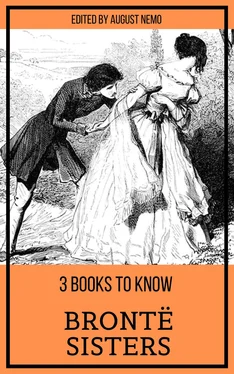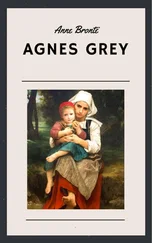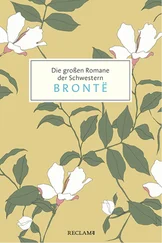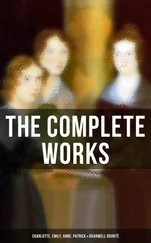‘She plays badly,’ said he, ‘I want to match my skill with yours. Come now! you can’t pretend you are reluctant to lay down your work. I know you never take it up except to pass an idle hour, when there is nothing better you can do.’
‘But chess-players are so unsociable,’ I objected; ‘they are no company for any but themselves.’
‘There is no one here but Milicent, and she—’
‘Oh, I shall be delighted to watch you!’ cried our mutual friend. ‘Two such players—it will be quite a treat! I wonder which will conquer.’
I consented.
‘Now, Mrs. Huntingdon,’ said Hargrave, as he arranged the men on the board, speaking distinctly, and with a peculiar emphasis, as if he had a double meaning to all his words, ‘you are a good player, but I am a better: we shall have a long game, and you will give me some trouble; but I can be as patient as you, and in the end I shall certainly win.’ He fixed his eyes upon me with a glance I did not like, keen, crafty, bold, and almost impudent;—already half triumphant in his anticipated success.
‘I hope not, Mr. Hargrave!’ returned I, with vehemence that must have startled Milicent at least; but he only smiled and murmured, ‘Time will show.’
We set to work: he sufficiently interested in the game, but calm and fearless in the consciousness of superior skill: I, intensely eager to disappoint his expectations, for I considered this the type of a more serious contest, as I imagined he did, and I felt an almost superstitious dread of being beaten: at all events, I could ill endure that present success should add one tittle to his conscious power (his insolent self-confidence I ought to say), or encourage for a moment his dream of future conquest. His play was cautious and deep, but I struggled hard against him. For some time the combat was doubtful: at length, to my joy, the victory seemed inclining to my side: I had taken several of his best pieces, and manifestly baffled his projects. He put his hand to his brow and paused, in evident perplexity. I rejoiced in my advantage, but dared not glory in it yet. At length, he lifted his head, and quietly making his move, looked at me and said, calmly, ‘Now you think you will win, don’t you?’
‘I hope so,’ replied I, taking his pawn that he had pushed into the way of my bishop with so careless an air that I thought it was an oversight, but was not generous enough, under the circumstances, to direct his attention to it, and too heedless, at the moment, to foresee the after-consequences of my move. ‘It is those bishops that trouble me,’ said he; ‘but the bold knight can overleap the reverend gentlemen,’ taking my last bishop with his knight; ‘and now, those sacred persons once removed, I shall carry all before me.’
‘Oh, Walter, how you talk!’ cried Milicent; ‘she has far more pieces than you still.’
‘I intend to give you some trouble yet,’ said I; ‘and perhaps, sir, you will find yourself checkmated before you are aware. Look to your queen.’
The combat deepened. The game was a long one, and I did give him some trouble: but he was a better player than I.
‘What keen gamesters you are!’ said Mr. Hattersley, who had now entered, and been watching us for some time. ‘Why, Mrs. Huntingdon, your hand trembles as if you had staked your all upon it! and, Walter, you dog, you look as deep and cool as if you were certain of success, and as keen and cruel as if you would drain her heart’s blood! But if I were you, I wouldn’t beat her, for very fear: she’ll hate you if you do—she will, by heaven! I see it in her eye.’
‘Hold your tongue, will you?’ said I: his talk distracted me, for I was driven to extremities. A few more moves, and I was inextricably entangled in the snare of my antagonist.
‘Check,’ cried he: I sought in agony some means of escape. ‘Mate!’ he added, quietly, but with evident delight. He had suspended the utterance of that last fatal syllable the better to enjoy my dismay. I was foolishly disconcerted by the event. Hattersley laughed; Milicent was troubled to see me so disturbed. Hargrave placed his hand on mine that rested on the table, and squeezing it with a firm but gentle pressure, murmured, ‘Beaten, beaten!’ and gazed into my face with a look where exultation was blended with an expression of ardour and tenderness yet more insulting.
‘No, never, Mr. Hargrave!’ exclaimed I, quickly withdrawing my hand.
‘Do you deny?’ replied he, smilingly pointing to the board. ‘No, no,’ I answered, recollecting how strange my conduct must appear: ‘you have beaten me in that game.’
‘Will you try another, then?’
‘No.’
‘You acknowledge my superiority?’
‘Yes, as a chess-player.’
I rose to resume my work.
‘Where is Annabella?’ said Hargrave, gravely, after glancing round the room.
‘Gone out with Lord Lowborough,’ answered I, for he looked at me for a reply.
‘And not yet returned!’ he said, seriously.
‘I suppose not.’
‘Where is Huntingdon?’ looking round again.
‘Gone out with Grimsby, as you know,’ said Hattersley, suppressing a laugh, which broke forth as he concluded the sentence. Why did he laugh? Why did Hargrave connect them thus together? Was it true, then? And was this the dreadful secret he had wished to reveal to me? I must know, and that quickly. I instantly rose and left the room to go in search of Rachel and demand an explanation of her words; but Mr. Hargrave followed me into the anteroom, and before I could open its outer door, gently laid his hand upon the lock. ‘May I tell you something, Mrs. Huntingdon?’ said he, in a subdued tone, with serious, downcast eyes.
‘If it be anything worth hearing,’ replied I, struggling to be composed, for I trembled in every limb.
He quietly pushed a chair towards me. I merely leant my hand upon it, and bid him go on.
‘Do not be alarmed,’ said he: ‘what I wish to say is nothing in itself; and I will leave you to draw your own inferences from it. You say that Annabella is not yet returned?’
‘Yes, yes—go on!’ said I, impatiently; for I feared my forced calmness would leave me before the end of his disclosure, whatever it might be.
‘And you hear,’ continued he, ‘that Huntingdon is gone out with Grimsby?’
‘Well?’
‘I heard the latter say to your husband—or the man who calls himself so—’
‘Go on, sir!’
He bowed submissively, and continued: ‘I heard him say,—“I shall manage it, you’ll see! They’re gone down by the water; I shall meet them there, and tell him I want a bit of talk with him about some things that we needn’t trouble the lady with; and she’ll say she can be walking back to the house; and then I shall apologise, you know, and all that, and tip her a wink to take the way of the shrubbery. I’ll keep him talking there, about those matters I mentioned, and anything else I can think of, as long as I can, and then bring him round the other way, stopping to look at the trees, the fields, and anything else I can find to discourse of.”’ Mr. Hargrave paused, and looked at me.
Without a word of comment or further questioning, I rose, and darted from the room and out of the house. The torment of suspense was not to be endured: I would not suspect my husband falsely, on this man’s accusation, and I would not trust him unworthily—I must know the truth at once. I flew to the shrubbery. Scarcely had I reached it, when a sound of voices arrested my breathless speed.
‘We have lingered too long; he will be back,’ said Lady Lowborough’s voice.
‘Surely not, dearest!’ was his reply; ‘but you can run across the lawn, and get in as quietly as you can; I’ll follow in a while.’
My knees trembled under me; my brain swam round. I was ready to faint. She must not see me thus. I shrunk among the bushes, and leant against the trunk of a tree to let her pass.
Читать дальше











